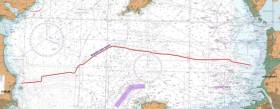Displaying items by tag: Rockabill Subsea Cable
The main lay installation works for the Rockabill Subsea Cable will take place from tomorrow, Saturday 20 July, to Sunday 1 September.
Using the vessel CS Teliri (callsign IBBT), the Rockabill cable system will be conducted from north of Lambay Island across the Irish Sea to Southport in England.
The cable itself is armoured and has an OD of 38mm. The cable ship will firstly clear the route of seabed debris with a grapnel before installing the cable.
During installation operations, the vessel will be moving slowly along the route while towing a sea plough to bury the cable into the seabed. During these works the vessel will have restricted manoeuvrability as it completes the work scope.
Deployed guard vessels will monitor the exposed areas of cable at crossing locations while burial progresses.
Ships are asked to avoid using anchors, bottom-trawl fishing and other seabed gear within half a mile of this cable route, and to maintain a safe distance from the cable ship during installation operations and that static gear be relocated from the route prior to commencement of operations.
Vessels are requested to pass at a safe speed and distance and fishing vessels are advised to remain a safe distance from the areas identified. Guard vessels will be deployed at certain cable crossing points to aid in monitoring the exposed areas and will advise of safe distances locally. The vessels will monitor VHF Channel 16 at all times.
The location co-ordinates of the operation are as included in Marine Notice No 24 of 2019, a PDF of which is available to read or download HERE.





























































